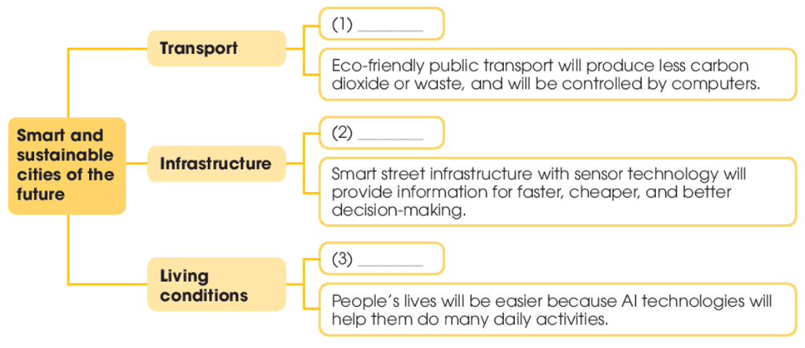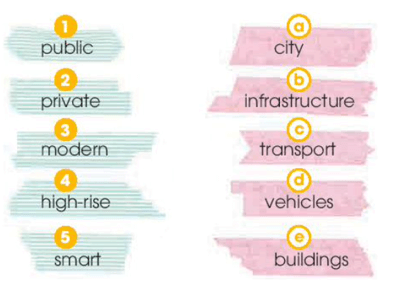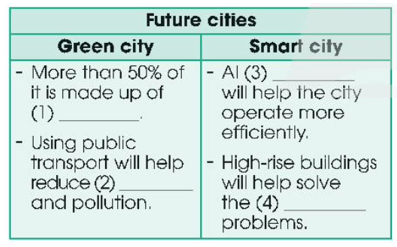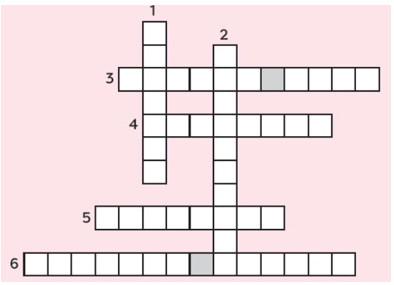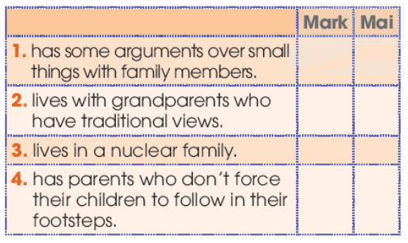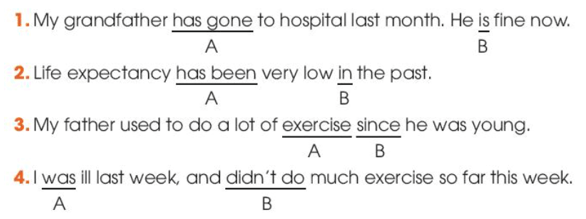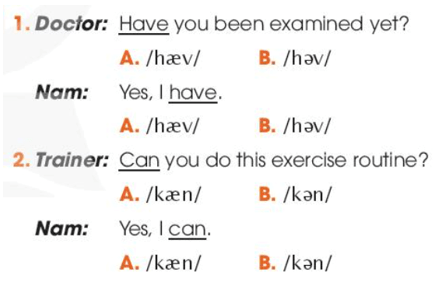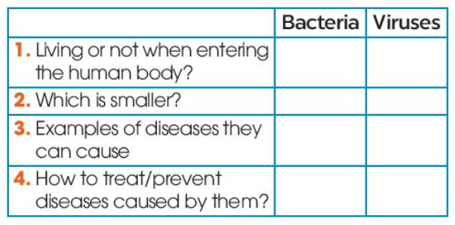Work in pairs. Complete the diagram with the ideas below (Làm việc theo cặp. Hoàn thành sơ đồ với những ý tưởng dưới đây)
A. Quality of life will be improved thanks to the cleaner environment.
B. There will be no private vehicles because people will use public transport.
C. Green skyscrapers will replace old blocks of flats and offices in crowded urban centres.
Giải Tiếng anh Unit 3 lớp 11 Speaking (trang 32, 33) - Global success
Read the article again and complete the diagram with information from the text. Use no more than TWO words for each answer (Đọc bài viết một lần nữa và hoàn thành sơ đồ với thông tin từ văn bản. Sử dụng không quá HAI từ cho mỗi câu trả lời)
Giải Tiếng anh Unit 3 lớp 11 Reading (trang 31, 32) - Global success
Read the article again and decide whether the statements are true (T) or false (F) (Đọc bài báo một lần nữa và quyết định xem những câu phát biểu là đúng (T) hay sai (F))
1. About 70 million people will live in cities by 2050.
2. Smart cities use modern technologies to save time and provide better services.
3. City dwellers will be able to grow vegetables underground or in roof gardens.
4. Space for walking and cycling will be replaced with computer-controlled transport systems.
Giải Tiếng anh Unit 3 lớp 11 Reading (trang 31, 32) - Global success
Read the article. Circle the correct meanings of the highlighted words and phrases (Đọc bài báo. Khoanh tròn nghĩa đúng của các từ và cụm từ được đánh dấu)
By 2050 the world’s population is expected to reach 10 billion, and nearly 70 per cent of these people will live in cities. The cities of the future wili be ‘smarter’ and more sustainable to cope with a growing population and improve people’s lives.
A smart city is amodern urban area that uses a range of technologies to provide services, solve problems, and support people better. The new technologies can help save time by predicting changes in the traffic and warning people of possible traffic jams. They will also help cities operate more efficiently. For example, street lights can turn off when the streets are empty, and sensors can inform waste collection teams when the bins are full. These smart technologies will help save energy, reduce air pollution, and fight climate change.
Cities in the future will also be sustainable. They will include a lot of green space and become home to more plants and animals. Making room for biodiversity and nature can be done in various ways including underground and rooftop farming, green roofs, and roof gardens. As people will care more about the environment, most cities will use renewable and clean energy. Modern infrastructure will also be more eco-friendly. Computer-controlled transport systems like electric buses and trains will produce less greenhouse gas emissions. In addition, more pedestrian zones for walking and cycle paths will be made available for people in all neighbourhoods.
These features will make future cities more liveable and will provide a high quality of life to city dwellers.
1. operate more efficiently
A. to work better without wasting time, money, or energy
B. to control a machine without wasting resources
C. to cut a body open for medical reasons in a more careful way
2. sensors
A. devices that can react to light, heat, or pressure
B. instruments that can be played by people
C. devices for discovering rubbish
3. pedestrian zones
A. areas for cars only
B. areas for electric buses
C. areas for walking only
4. liveable
A. suitable for farming
B. nice to live in
C. good for the environment
Giải Tiếng anh Unit 3 lớp 11 Reading (trang 31, 32) - Global success
Work in pairs. Talk about future developments in your neighbourhood. Use stative verbs in continuous form and linking verbs. (Làm việc theo cặp. Nói về những phát triển trong tương lai trong khu phố của bạn. Sử dụng động từ trạng thái ở dạng tiếp diễn và động từ nối)
Gợi ý:
A: The construction company is developing a new housing project near our neighborhood.
B: That's interesting. The population in our area will increase, and the demand for services and infrastructure will grow.
Giải Tiếng anh Unit 3 lớp 11 Language trang 29, 30, 31 - Global success
Grammar: Linking verbs
Find and correct the mistakes in the following sentences. (Tìm và sửa lỗi sai trong các câu sau)
1. The urban lifestyle seems more excitingly to young people.
2. The museum looks beauty from a distance.
3. Widening the road sounds a good solve to traffic problems in the area.
Giải Tiếng anh Unit 3 lớp 11 Language trang 29, 30, 31 - Global success
Grammar: Stative verbs in the continuous form
Choose the correct forms of the verbs to complete the following sentences. (Chọn dạng đúng của động từ để hoàn thành các câu sau)
1. I (think / am thinking) that living in the city is good for young people.
2. We (are thinking / think) of moving out of the city.
3. I (don’t see / am not seeing) the building. It's too far away.
Giải Tiếng anh Unit 3 lớp 11 Language trang 29, 30, 31 - Global success
Complete the sentences using the correct forms of the words and phrases in 1 (Hoàn thành các câu bằng cách sử dụng các hình thức đúng của các từ và cụm từ trong bài 1)
1. Building a good _______ is important for the country’s economy.
2. The new underground has allowed ________ to get around more easily.
3. With the help of technology, people can now grow vegetables in ______ of high-rise buildings.
4. The ______ attracts people’s attention because of its unusual architecture.
5. More people are moving away from the _______ of large cities to the suburbs.
Giải Tiếng anh Unit 3 lớp 11 Language trang 29, 30, 31 - Global success
Complete the sentences with phrases from 1 (Hoàn thành các câu với các cụm từ từ 1)
1. It _________ to many environmental problems.
2. The modern infrastructure of the city __________.
3. I _________ living in a smart city in the future.
Giải Tiếng anh Unit 3 lớp 11 Getting Started (trang 28, 29) - Global success
Read the conversation again and complete the notes. Use no more than TWO words for each blank (Đọc đoạn hội thoại một lần nữa và hoàn thành các ghi chú. Sử dụng không quá HAI từ cho mỗi chỗ trống)
Giải Tiếng anh Unit 3 lớp 11 Getting Started (trang 28, 29) - Global success
An exhibition of future cities
Listen and read (Nghe và đọc)
Bài nghe:
Ms Smith: Good morning. Welcome to our exhibition: Future Cities. Here you can see models of our cities of the future. Please take a look around and feel free to ask me any questions.
Nam: This model looks very interesting. Can you tell me more about it, Ms Smith?
Ms Smith: Yes. This is a ‘green city’ designed to reduce its negative impact on the environment. As you can see, more than fifty per cent of it is made up of green areas.
Nam: I don’t see any private vehicles on the roads.
Ms Smith: Most people will use public transport such as trams and electric buses. There will be fewer traffic jams and less pollution.
Nam: So city dwellers will stop using their cars in urban areas.
Ms Smith: That's the idea.
Nam: I like it. It seems a good solution to many environmental problems.
(...)
Mai: Let’s look at the city over there. I can see robots and lots of cameras in the streets. What's special about this city?
Ms Smith: It's called a ‘smart city’. Al technologies, such as cameras and smart sensors, will be installed to help the city operate more efficiently.
Mai: The modern infrastructure of the city looks beautiful. I’m really impressed with the high-rise buildings.
Ms Smith: Tall buildings can actually limit the carbon footprint of the built environment and help solve housing problems in big cities.
Mai: Mmm, I'm thinking of living in a smart city in the future.
Giải Tiếng anh Unit 3 lớp 11 Getting Started (trang 28, 29) - Global success
Work in groups. Each member of your group should ask three people from different generations to complete the survey below. (Làm việc nhóm. Mỗi thành viên trong nhóm của bạn nên yêu cầu ba người thuộc các thế hệ khác nhau hoàn thành bản khảo sát dưới đây.)
These people could include:
1) a classmate or brother/ sister
2) a mother/ father, or someone of their generation
3) a grandma/ grandpa, or someone of their generation
Giải Tiếng anh Unit 2 lớp 11 Project (trang 27) - Global success
Grammar
Choose the correct answers A, B, C or D to complete the following sentences (Chọn đáp án đúng A, B, C hoặc D để hoàn thành các câu sau)
1. You __________ learn to keep your bedroom tidy. No one can clean it for you.
A. must B. had to
C. mustn‘t D. shouldn’t
2. Fifty years ago, my grandmother ____________ stay at home and do all housework. She couldn't go to school like her brothers.
A. must B. had to
C. didn't have to D. should
3. You ___________ wear shorts to school. It's against the school rules.
A. should B. have to
C. mustn't D. don't have to
4. I think parents ___________ compare their children to other's. They will become less confident in their abilities.
A. should B. have to
C. must D. shouldn’t
5. My parents respect my choices. I ___________ follow in their footsteps.
A. don’t have to B. mustn‘t
C. should D. have to
Giải Tiếng anh Unit 2 lớp 11 Looking Back (trang 26, 27) - Global success
Vocabulary
Solve the crossword. Use the words or phrases you have learn in this unit (Giải ô chữ. Sử dụng các từ hoặc cụm từ bạn đã học trong phần này)
DOWN
1. Lan lives in a __________ family that consists of her parents and younger sister.
2. The older _________ usually has more traditional views.
ACROSS
3. My father limits my __________. I can only use my laptop and smartphone to watch videos or check social media for two hours a day.
4. I live with my __________ family in a big house, and I’m very close not only to my parents, but also to my grandparents, aunt, and uncle.
5. Teenagers often come into ___________ with their parents.
6. My sister is a true ____________. She has used computers and smartphones since she was young and is very good at using them.
Giải Tiếng anh Unit 2 lớp 11 Looking Back (trang 26, 27) - Global success
Pronunciation
Listen and circle what you hear: contracted or full forms. Practice saying these conversations in pairs. (Nghe và khoanh tròn những gì bạn nghe được: dạng rút gọn hoặc dạng đầy đủ. Thực hành nói những cuộc hội thoại này theo cặp)
Bài nghe:
1. A: You (1) mustn’t / must not be rude to your parents.
B: Yes, Grandma. But my parents (2) don’t / do not listen to me.
2. A: (3) It’s / It is 11 o’clock. Have you done your homework yet?
B: Yes, (4) I’ve / I have.
Giải Tiếng anh Unit 2 lớp 11 Looking Back (trang 26, 27) - Global success
Work in groups. Discuss the following questions (Làm việc nhóm. Thảo luận các câu hỏi sau)
Do you think your family would experience the same generation gap if you moved to a Western country? Why/ Why not? (Bạn có nghĩ rằng gia đình bạn sẽ trải qua khoảng cách thế hệ giống nhau nếu bạn chuyển đến một quốc gia phương Tây không? Tại sao / Tại sao không?)
Giải Tiếng anh Unit 2 lớp 11 Communication and Culture (trang 25, 26) - Global success
Culture
Read the text and complete the notes. Use no more than TWO words for each gap (Đọc văn bản và hoàn thành các ghi chú. Sử dụng không quá HAI từ cho mỗi chỗ trống)
For people in most cultures, the generation gap in their family is mainly about differences in musical tastes, career choices, and lifestyles. In Asian American families, however, the process of adapting to American culture makes the generation gap wider.
Naturally, children of Asian American immigrants adapt to American culture much faster than their parents. English quickly becomes their first language. They accept American values such as individualism, freedom, honesty, and competition. They also start to follow American traditions in their daily lives.
On the other hand, many first-generation Asian American parents fail to adapt to the new culture. They continue to use their native language. They keep practising their traditional lifestyle and old culture. They often try to force their children to follow their native country’s cultural values, such as the importance of family, respect for the elders and the community.
Due to their different attitudes to the new culture, Asian American children may have cultural values different from their parents’ Asian cultural values. They may not do what their parents want them to do or what they are expected to do. As aresult, Asian American parents may fail to have their children follow the family traditional values.
Giải Tiếng anh Unit 2 lớp 11 Communication and Culture (trang 25, 26) - Global success
Work in pairs. Use the model in 1 to make similar conversations for these situations (Làm việc theo cặp. Sử dụng mô hình trong phần 1 để tạo các hội thoại tương tự cho các tình huống này)
One of you is Student A, the other is Student B. Provide reasons for not giving permission. Use the expressions below to help you.
1. Student A is a teenager: Student B is his / her parent. Student A is asking for permission to invite friends to a party. Student B can decide to give permission or not.
2. Student B is a teenager; Student A is his / her parent. Student B is asking for permission to colour his / her hair. Student A can decide to give permission or not.
Giải Tiếng anh Unit 2 lớp 11 Communication and Culture (trang 25, 26) - Global success
Everyday English
Listen and complete the conversation with the expressions in the box. Then practise it in pairs (Nghe và hoàn thành cuộc hội thoại với các từ trong hộp. Sau đó thực hành nó theo cặp)
Bài nghe:
Lan: Mum, (1) ____________ go to my friend's birthday party this Saturday evening?
Lan’s mother: (2) ____________. Whose birthday is it?
Lan: It’s Mai’s birthday, Mum. (3) ____________ if I stay the night at her house after the party?
Lan’s mother: Oh, (4)___________. You must come back home before 10 p.m. We're going to visit your grandparents early on Sunday morning.
Lan: OK, Mum. I'll be home before 10 p.m. then.
Giải Tiếng anh Unit 2 lớp 11 Communication and Culture (trang 25, 26) - Global success
Read an opinion essay and match each paragraph with the correct description (Đọc một bài luận ý kiến và nối mỗi đoạn với mô tả chính xác)
A. Second reason for supporting this view with examples and facts
B. Conclusion summarising the writer's point of view
C. First reason for supporting this view with examples and facts
D. Introduction to the issue and the writer’s point of view
SHOULD PARENTS STRICTLY LIMIT TEENAGERS’ SCREEN TIME?
1. ______ Many teenagers nowadays spend too much time on digital devices. I firmly believe that parents should strictly limit their screen time for two reasons.
2. ______First of all, teenagers who spend a lot of time on screens are fess likely to finish their homework. If parents limit their screen time, teenagers will have more time not only for learning, but also for outdoor activities.
3. ______ In addition, too much screen time is bad for teenagers’ health. Looking at a computer or smartphone screen for a long time can damage their eyesight and cause headaches. Too much screen time may also lead to sleep and weight problems.
4. ______ In conclusion, I think that parents need to control the time their teenage children spend on digital devices. This will ensure that their children have time for homework and outdoor activities, and will protect children’s health.
Giải Tiếng anh Unit 2 lớp 11 Writing (trang 24) - Global success
Work in pairs. Complete the notes using the sentences (A-D) in the box (Làm việc theo cặp. Hoàn thành các ghi chú bằng cách sử dụng các câu (A-D) trong hộp)
A. The gap between teenagers and parents may become wider.
B. Too much screen time is bad for teenagers’ health.
C. Too much screen time can damage eyesight, reduce sleep time, and cause weight gain.
D. Teenagers may think their parents are not fair to them.
Giải Tiếng anh Unit 2 lớp 11 Writing (trang 24) - Global success
Work in groups. Discuss the following questions. (Làm việc nhóm. Thảo luận các câu hỏi sau)
Do you agree with Mai’s mother and Kevin’s parents? Why/ Why not? (Bạn có đồng ý với mẹ Mai và bố mẹ Kevin không? Tại sao / Tại sao không?)
Giải Tiếng anh Unit 2 lớp 11 Listening trang 23 - Global success
Listen to the conversation again and answer the following questions using no more than TWO words (Nghe đoạn hội thoại một lần nữa và trả lời các câu hỏi sau bằng cách sử dụng không quá HAI từ)
Bài nghe:
1. What does Mai’s mother keep complaining about?
2. Where doesn’t Mai’s mother allow her to wear tight jeans?
3. What does Kevin mainly use his snartphone and laptop for?
4. According to Mai, what might Kevin’s parents worry about?
5. What time do Kevin's parents take away his smartphone and laptop?
Giải Tiếng anh Unit 2 lớp 11 Listening trang 23 - Global success
Choose the modal verbs used in 1 to complete the sentences (Chọn các động từ khiếm khuyết được sử dụng trong 1 để hoàn thành các câu)
1. Mai lives with her extended family, and she (has to / should) learn to accept the differences between the generations.
2. Mai’s grandmother thinks women (have to / should) do all the housework.
3. Mai’s parents believe that children (must / should) follow their dreams.
4. Ms Hoa thinks that children (have to / must) respect their parents and grandparents.
Giải Tiếng anh Unit 2 lớp 11 Getting Started (trang 18, 19) - Global success
Find words or phrases in 1 that have the following meanings. (Tìm từ hoặc cụm từ trong 1 có nghĩa sau đây)
1. all people who were born at about the same time
2. a family that consists of a father, a mother, and children
3. a family that includes not only parents and children but also uncles, aunts, grandparents, etc.
4. disagreement about things
Giải Tiếng anh Unit 2 lớp 11 Getting Started (trang 18, 19) - Global success
What is a generation gap?
Listen and read (Nghe và đọc)
Bài nghe:
Ms Hoa: Good morning, class. Today, we'll talk about the generation gap. So, what is the generation gap?
Mark: Well, I think it’s the difference in beliefs and behaviours between young and older people.
Ms Hoa: You're right, Mark, So, is there a generation gap in your family?
Mark: Not really, Ms Hoa. I live in a nuclear family with my parents and brother. We understand each other quite well though we still argue over small things.
Ms Hoa: Right. We can't avoid daily arguments. What about you, Mai?
Mai: Well. I live with my extended family, and I have to learn to accept the differences between the generations.
Ms Hoa: That's a good point. Can you give us an example?
Mai: Well, my grandparents hold traditional views about male jobs and gender roles. For example, my grandfather wants my brother to be an engineer. but my brother hopes to become a musician. And my grandmother thinks women have to do all the housework.
Ms Hoa: How about your parents? Do they share your grandparents’ views?
Mai: No, they don’t. They think that we should follow our dreams. They give us advice, but never force us to follow in their footsteps.
Ms Hoa: Thank you, Mai, for sharing your experiences. You must respect your parents and grandparents, but you should also express your opinion. Now let’s continue our discussion with ...
Giải Tiếng anh Unit 2 lớp 11 Getting Started (trang 18, 19) - Global success
HEALTHY HABITS POSTERS
Work in groups. Design a poster to help teens to develop a healthy habit (e.g. having a balanced diet, taking regular exercise, protecting themselves against certain diseases). (Làm việc nhóm. Thiết kế một áp phích để giúp thanh thiếu niên hình thành thói quen lành mạnh (ví dụ: có chế độ ăn uống cân bằng, tập thể dục thường xuyên, bảo vệ bản thân khỏi một số bệnh).)
Present your poster to the class. Use these questions as cues for your presentation. (Trình bày áp phích của bạn cho cả lớp. Sử dụng những câu hỏi này làm tín hiệu cho bài thuyết trình của bạn.)
• What is the healthy habit? (Thói quen lành mạnh là gì?)
• What are the benefits of this habit? (Lợi ích của thói quen này là gì?)
• How can we develop this habit? (Làm thế nào chúng ta có thể phát triển thói quen này?)
Bài làm:
Giải Tiếng anh Unit 1 lớp 11 Project (trang 17) - Global success
Vocabulary
Fill in each gap with ONE word. Use the words you have learnt in this unit. (Điền vào mỗi khoảng trống với MỘT từ. Sử dụng những từ bạn đã học trong unit này.)
1. We need to (1) down on fast food if we don't want to (2) from heart diseases in the future.
2. (3) out regularly and having a (4) diet are the key to a healthy lifestyle.
3. Antibiotics are not used in the (5) of diseases caused by viruses.
Giải Tiếng anh Unit 1 lớp 11 Looking Back (trang 16, 17) - Global success
Pronunciation
Circle the common pronunciation of the underlined auxiliary verbs. Then listen and check. Practise saying the conversations in pairs. (Khoanh tròn cách phát âm phổ biến của các trợ động từ được gạch chân. Sau đó nghe và kiểm tra. Thực hành nói các cuộc hội thoại theo cặp.)
Bài nghe:
Giải Tiếng anh Unit 1 lớp 11 Looking Back (trang 16, 17) - Global success
CLIL
Read the text and complete the comparison table below (Đọc văn bản và hoàn thành bảng so sánh dưới đây)
BACTERIA AND VIRUSES
Both bacteria and viruses can cause diseases, but they are different in many ways.
Bacteria are living organisms. They can live in many places, such as soil, water, and the human body. The smallest bacteria are about 0.4 micron in diameter. Some bacteria in our bodies are helpful, but some can cause infectious diseases such as tuberculosis or food poisoning. Antibiotics are often used to treat infections caused by bacteria.
Viruses are tiny germs that cause diseases in people, animals, and plants. They can cause a range of illnesses, from the common cold or the flu to more serious diseases such as AIDS and Covid-19. As they are very small (0.02 to 0.25 micron), viruses can get into our bodies easily. They are not living things, so they need to enter our bodies to become active. Then, they start to grow and cause the infected cell to make millions of copies of the virus. Vaccines are often used to prevent the spread of diseases caused by viruses.
Giải Tiếng anh Unit 1 lớp 11 Communication and Culture (trang 15, 16) - Global success
Work in pairs. Use the model in 1 to make similar conversations for these situations. One of you is Student A, the other is Student B. Use the expressions below to help you. (Làm việc theo cặp. Sử dụng mẫu bài 1 để tạo các hội thoại tương tự cho các tình huống này. Một trong số các bạn là Học sinh A, người kia là Học sinh B. Sử dụng các diễn đạt dưới đây để giúp bạn.)
1. Student A is a PE teacher; Student B is a student. Student B is trying to do an exercise routine, and Student A is offering help.
2. Student B is a supermarket assistant; Student A is a customer. Student A is trying to find some healthy foods for his/her family, and Student B is offering help.
Giải Tiếng anh Unit 1 lớp 11 Communication and Culture (trang 15, 16) - Global success
Everyday English
Offering help and responding
Listen and complete the conversation with the expressions in the box. Then practise it in pairs. (Nghe và hoàn thành cuộc hội thoại với các biểu thức trong hộp. Sau đó thực hành nó theo cặp.)
Bài nghe:
|
A. Can I help you with that |
B. Is there anything else I can do for you |
|
C. Thank you very much |
D. Thanks, but I think I'm fine |
Trainer: Good morning. (1)?
Tam: Oh, please. I want to change the speed on this treadmill, but I don't know how.
Trainer: You can just press this button. Here, let me show you.
Tam: Oh, it's working. (2).
Trainer: (3)?
Tam: (4) now.
Trainer: Great! Have a good workout.
Giải Tiếng anh Unit 1 lớp 11 Communication and Culture (trang 15, 16) - Global success

